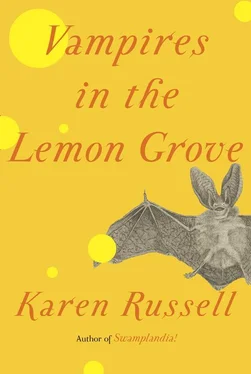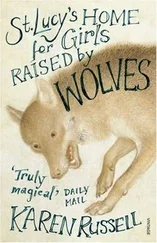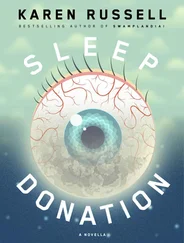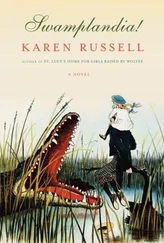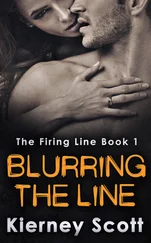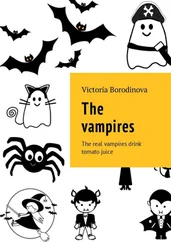“Sooo,” Magreb would say, “I can tell you’re not a morning person.” Then she’d sit on the porch swing and rock with me, patting my hand.
“What’s wrong, Clyde?”
I shook my head. This was a new sadness, difficult to express. My bloodlust was undiminished but now the blood wouldn’t fix it.
“It never fixed it,” Magreb reminded me, and I wished she would please stop talking.
That cluster of years was a very confusing period. Mostly I felt grateful, aboveground feelings. I was in love. For a vampire, my life was very normal. Instead of stalking prostitutes, I went on long bicycle rides with Magreb. We visited botanical gardens and rowed in boats. In a short time, my face had gone from lithium white to the color of milky coffee. Yet sometimes, especially at high noon, I’d study Magreb’s face with a hot, illogical hatred, each pore opening up to swallow me. You’ve ruined my life , I’d think. To correct for her power over my mind I tried to fantasize about mortal women, their wild eyes and bare swan necks; I couldn’t do it, not anymore — an eternity of vague female smiles eclipsed by Magreb’s tiny razor fangs. Two gray tabs against her lower lip.
But like I said, I was mostly happy. I was making a kind of progress.
One night, children wearing necklaces of garlic bulbs arrived giggling at our door. It was Halloween; they were vampire hunters. The smell of garlic blasted through the mail slot, along with their voices: “Trick or treat!” In the old days, I would have cowered from these children. I would have run downstairs to barricade myself in my coffin. But that night, I pulled on an undershirt and opened the door. I stood in a square of green light in my boxer shorts hefting a bag of Tootsie Pops, a small victory over the old fear.
“Mister, you okay?”
I blinked down at a little blond child and then saw that my two hands were shaking violently, soundlessly, like old friends wishing not to burden me with their troubles. I dropped the candies into the children’s bags, thinking: You small mortals don’t realize the power of your stories .
WE WERE DOWNING strawberry velvet cocktails on the Seine when something inside me changed. Thirty years. Eleven thousand dawns. That’s how long it took for me to believe the sun wouldn’t kill me.
“Want to go see a museum or something? We’re in Paris, after all.”
“Okay.”
We walked over a busy pedestrian bridge in a flood of light, and my heart was in my throat. Without any discussion, I understood that Magreb was my wife.
Because I love her, my hunger pangs have gradually mellowed into a comfortable despair. Sometimes I think of us as two holes cleaved together, two twin hungers. Our bellies growl at each other like companionable dogs. I love the sound, assuring me we’re equals in our thirst. We bump our fangs and feel like we’re coming up against the same hard truth.
Human marriages amuse me: the brevity of the commitment and all the ceremony that surrounds it, the calla lilies, the veiled mother-in-laws like lilac spiders, the tears and earnest toasts. Till death do us part! Easy. These mortal couples need only keep each other in sight for fifty, sixty years.
Often I wonder to what extent a mortal’s love grows from the bedrock of his or her foreknowledge of death, love coiling like a green stem out of that blankness in a way I’ll never quite understand. And lately I’ve been having a terrible thought: Our love affair will end before the world does .
One day, without any preamble, Magreb flew up to the caves. She called over her furry, muscled shoulder that she just wanted to sleep for a while.
“What? Wait! What’s wrong?”
I’d caught her mid-shift, halfway between a wife and a bat.
“Don’t be so sensitive, Clyde! I’m just tired of this century, so very tired, maybe it’s the heat? I think I need a little rest …”
I assumed this was an experiment, like my cape, an old habit to which she was returning, and from the clumsy, ambivalent way she crashed around on the wind I understood I was supposed to follow her. Well, too bad. Magreb likes to say she freed me, disabused me of the old stories, but I gave up more than I intended: I can’t shudder myself out of this old man’s body. I can’t fly anymore.
FILA AND I are alone. I press my dry lips together and shove dominoes around the table; they buckle like the cars of a tiny train.
“More lemonade, nonno ?” She smiles. She leans from her waist and boldly touches my right fang, a thin string of hanging drool. “Looks like you’re thirsty.”
“Please,” I gesture at the bench. “Have a seat.”
Fila is seventeen now and has known about me for some time. She’s toying with the idea of telling her boss, weighing the sentence within her like a bullet in a gun: There is a vampire in our grove .
“You don’t believe me, Signore Alberti?” she’ll say, before taking him by the wrist and leading him to this bench, and I’ll choose that moment to rise up and bite him in his hog-thick neck. “Right through his stupid tie!” she says with a grin.
But this is just idle fantasy, she assures me. Fila is content to let me alone. “You remind me of my nonno ,” she says approvingly, “you look very Italian.”
In fact, she wants to help me hide here. It gives her a warm feeling to do so, like helping her own fierce nonno do up the small buttons of his trousers, now too intricate a maneuver for his palsied hands. She worries about me, too. And she should: lately I’ve gotten sloppy, incontinent about my secrets. I’ve stopped polishing my shoes; I let the tip of one fang hang over my pink lip. “You must be more careful,” she reprimands. “There are tourists everywhere .”
I study her neck as she says this, her head rolling with the natural expressiveness of a girl. She checks to see if I am watching her collarbone, and I let her see that I am. I feel like a threat again.
LAST NIGHT I went on a rampage. On my seventh lemon I found with a sort of drowsy despair that I couldn’t stop. I crawled around on all fours looking for the last bianchettis in the dewy grass: soft with rot, mildewed, sun-shriveled, blackened. Lemon skin bulging with tiny cellophane-green worms. Dirt smells, rain smells, all swirled through with the tart sting of decay.
In the morning, Magreb steps around the wreckage and doesn’t say a word.
“I came up with a new name,” I say, hoping to distract her. “ Brandolino . What do you think?”
I have spent the last several years trying to choose an Italian name, and every day that I remain Clyde feels like a defeat. Our names are relics of the places we’ve been. “Clyde” is a souvenir from the California Gold Rush. I was callow and blood-crazed back then, and I saw my echo in the freckly youths panning along the Sacramento River. I used the name as a kind of bait. “Clyde” sounded innocuous, like someone a boy might get a malt beer with or follow into the woods.
Magreb chose her name in the Atlas Mountains for its etymology, the root word ghuroob , which means “to set” or “to be hidden.” “That’s what we’re looking for,” she tells me. “The setting place. Some final answer.” She won’t change her name until we find it.
She takes a lemon from her mouth, slides it down the length of her fangs, and places its shriveled core on the picnic table. When she finally speaks, her voice is so low the words are almost unintelligible.
“The lemons aren’t working, Clyde.”
But the lemons have never worked. At best, they give us eight hours of peace. We aren’t talking about the lemons.
“How long?”
“Longer than I’ve let on. I’m sorry.”
Читать дальше
